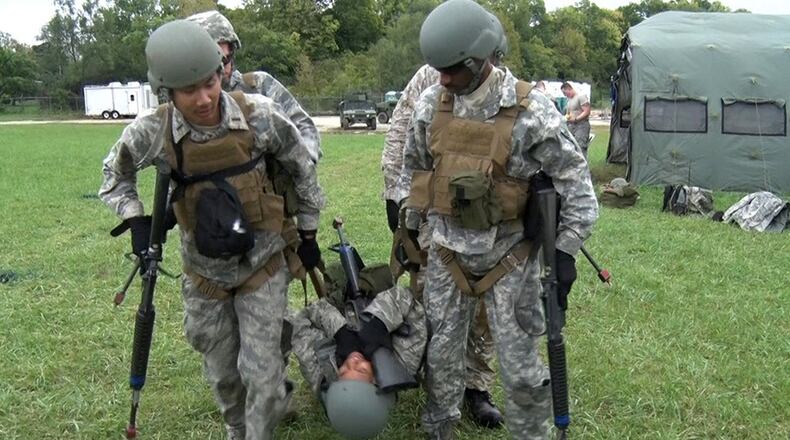“The Air Force SBIR/STTR Program and its small business partners strive for advancements that support warfighters across the Department of Defense and meet near-term critical needs while filling the pipeline with potential game-changing technologies,” said Air Force SBIR/STTR Program Director David Shahady. “In stressing innovation over invention, the program works to drive down costs, get the best new technology to the warfighter and boost the economy through small business growth.”
For example, Rockledge, Florida-based Mainstream Engineering Corp. brought multiple technologies to Operation Tech Warrior, including an ATV for which the company makes an engine that can run on any fuel; a water processing system that allows sink water to be returned to drinking water quality; and an environmental control unit, also known as an ECU, used for cooling shelters in the field.
Integrating those products into Operation Tech Warrior provided a more direct line to applications at operating bases, so the company got to see its use and issues through that perspective.
For the ECU, Mainstream Engineering originally received an Air Force SBIR award to improve its efficiency. Feedback provided at Operation Tech Warrior – such as a request to replace one of the electric connectors with a different product – is expected to drive even more improvements.
“This event gets technology out of the lab and into the field, so it is very valuable,” said Robert Scaringe, president and founder of Mainstream Engineering.
The idea behind the Tech Warrior Enterprise, which combines training exercises with fledgling technology, is to accelerate critical tools and solutions developed by small businesses to the warfighter. For small businesses, it provides a proving ground and fosters long-term relationships with potential end-user groups to better posture technology for commercialization and transitions.
A wide range of technologies were integrated into training missions at Operation Tech Warrior. Many of the trainees were subject matter experts from the Air Force Research Laboratory, who would not normally get an opportunity to see how technology performs in combat. The cadre of instructors, comprised of warfighters with a myriad of combat deployment experience, also provided critical feedback to business participants.
A technology evaluation board comprised of warfighters – along with technology analysts and top program management personnel from the Air Force SBIR/STTR Program – met during Operation Tech Warrior to assist companies in finding additional opportunities to meet warfighter needs. A technology scout from U.S. Central Command was also at the event and identified more than a dozen technologies that may align with warfighter needs in the combatant commands.
Miamisburg, Ohio-based Cornerstone Research Group brought its aeromedical patient stabilization platform to Operation Tech Warrior. Also known as ATLIS, the platform is designed to provide a more secure method of transporting patients in flight while averting the pressure sores and other physical problems caused by the extended use of a traditional stretcher.
Developed with an Army SBIR contract and a Cooperative Research and Development Agreement through the Air Force Technology Transfer Program, Operation Tech Warrior allowed the company to test new strap configurations with multiple user groups as well as test loading onto different types of vehicles.
“We wouldn’t have gotten access to the vehicles as readily unless we were here,” said Joshua Neiman, a research engineer at Cornerstone Research Group. “Being able to improve straps is a small nuance that will make a big improvement to the patient experience.”
San Francisco-based HVMN brought its ketone ester drink to Operation Tech Warrior. The drink – with ties to the SOCOM SBIR/STTR Program – is designed to improve warfighter performance both physically and cognitively.
“It was really useful to speak to the participants and find out what their operational needs are when they’re out on this kind of exercise, but also to speak to other technology companies that are here to see how they’ve been working with the military to refine and then bring their technologies from concept to be applied,” said Brianna Stubbs, head of science for HVMN.
“Failing forward” is the upside of Operation Tech Warrior in that businesses get to operate in an environment without the fear of their products and services not working as planned. Organizers say failing at the event is acceptable because it shows what needs to be fixed and is the best way to mature products and technology.
Baton Rouge, Louisiana-based Carver Scientific brought its microclimate cooling device, which fits under body armor and was developed with support from the Air Force SBIR/STTR Program. Attending Operation Tech Warrior allowed the device to be used in rainy conditions for the first time.
Ritchie Priddy, business development director for Carver Scientific, said the device’s performance was hindered by participants wearing ponchos. However, now he is aware of the issue and has ideas about how to fix it.
Carver Scientific has participated in all three components of the Tech Warrior Enterprise. The result has been feedback from a wide array of stakeholders ranging from first responders and special operations personnel to senior-level leaders, scientists and engineers.
“It’s been an incredibly awesome experience,” Priddy said.
In addition to Operation Tech Warrior held in September, the expanded Tech Warrior Enterprise also includes Tech Warrior OPS, held several times a year to match technology with operators, and Tech Warrior CONNECT, which provides one-on-one assistance to small businesses throughout the year.
Any small businesses with an Air Force research and development contract, especially those involved in the Air Force SBIR/STTR Program, may request to participate in the Tech Warrior Enterprise by working with its government contact or by contacting twenterprise@wright.edu
Participation in Tech Warrior events is free for companies, which only pay for travel expenses.
About the Author
